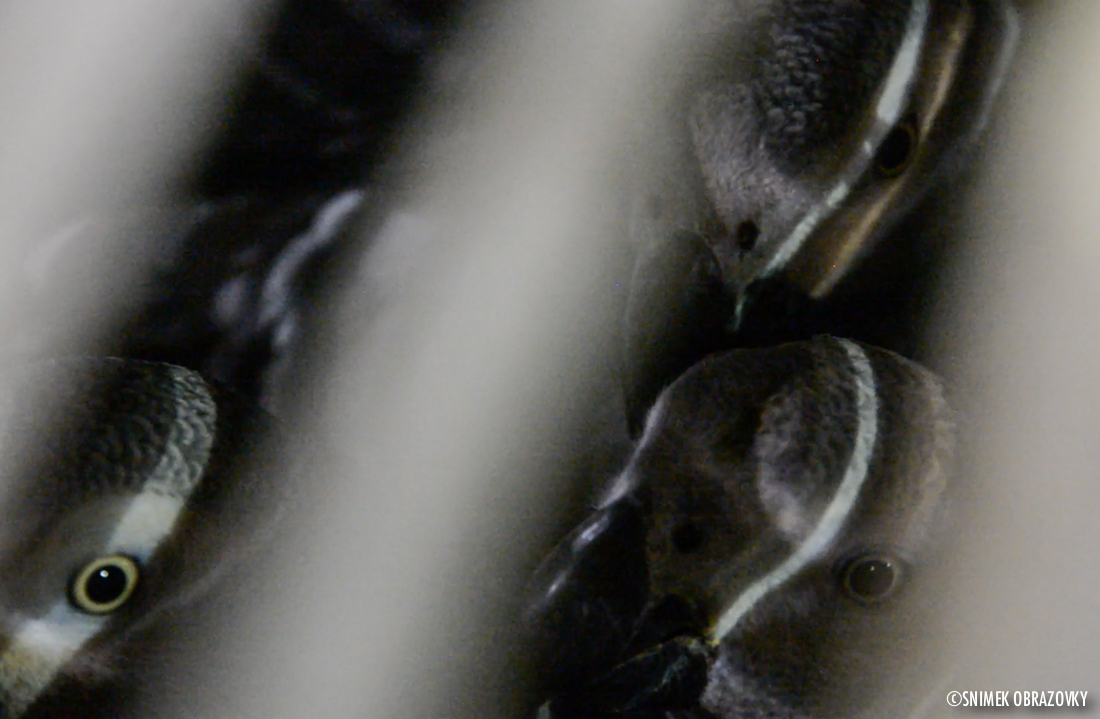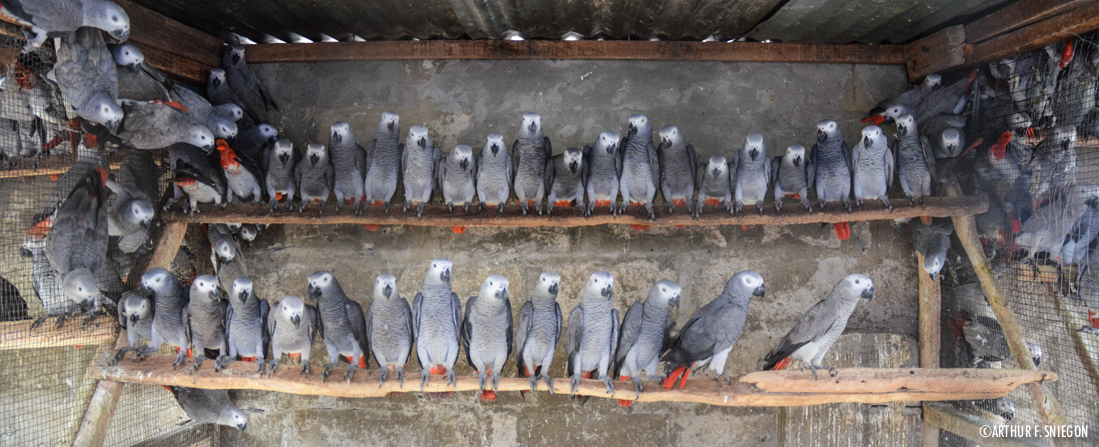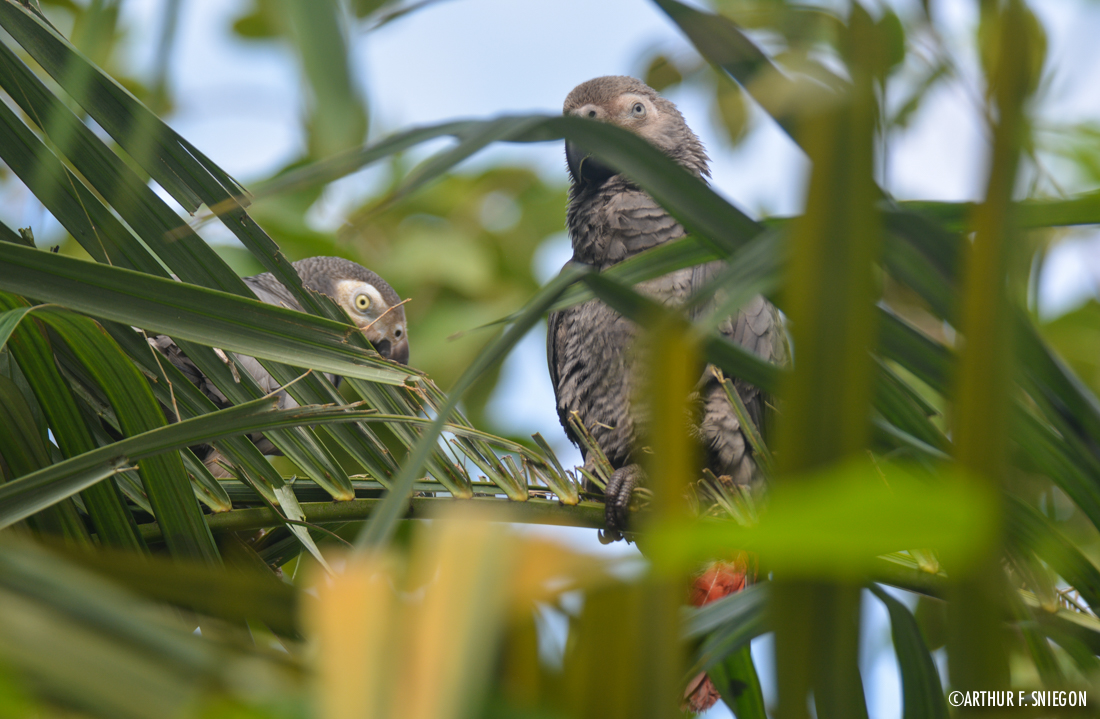
over 100 African grey parrots seized in northern Congo
Last month over one hundred illegally captured African Grey Parrots (Psittacus erithacus) were seized in northern Republic of Congo, not long after the world’s most trafficked bird was offered extra protection at the CITES CoP in September 2016. The seizures, leading to the arrest of three trans-boundary traffickers, took place during operations carried out by teams of rangers and investigators working under the Nouabale-Ndoki Foundation, a public-private partnership between the Congolese Government and WCS Congo which manages the protection of Nouabalé-Ndoki National Park and the forest on its periphery.
”The song of African Grey Parrots is the lively heartbeat of central Africa’s rainforests. Snaking along the Sangha River that meanders past Nouabale-Ndoki’s Bomassa headquarters at dawn or dusk, one bears witness to an orchestra of parrots flying overhead. Sadly, this magical spectacle has become rare outside of protected areas leaving large tracts of Central Africa’s forests eerily silent without their calls.
African Grey Parrots are the most popular avian pet in the US, Europe and in the Middle East and are also widely domesticated within Africa. Due to years of unsustainable harvest and trade, and expanding and increasing loss of habitat, the species has seen rapid population declines and as a result were up listed to CITES Appendix 1 following strong debate and a rare secret vote at the CITES CoP at the end of 2016. There is however a lag in these restrictions being written into laws for the protection of wildlife at the national level.
African Grey Parrots are still listed as ‘Partially Protected’ in the Republic of Congo, allowing the legal capture and trade of parrots if the trader holds a valid permit. As the law stands, traffickers will only spend a maximum sentence of 18 months in jail and fines of up to 500,000 XAF ($800) if caught with unpermitted parrots – a tame cost in comparison to the benefits that traffickers could gain from a shipment of over a hundred birds.

The habits of African Greys make them easy to locate at repeatedly used roosts and feeding grounds, but the physical act of capturing these birds is a more difficult task. One method involves collectors venturing deep into the forest in search of a giant emergent tree, towering up above the forest canopy. They then wait until nightfall and climb up to the highest branches carrying bunches of raffia palm leaves. The palm brushes are coated in strong chemical glue and tied up in the tree canopy, about 20 meters above the ground.
One or two captive parrots are taken along on the mission and once the glue trap has been set a captive African Grey is tied up next to the sticky bunches of palm leaves. The solitary domesticated parrot starts to call, attracting inquisitive passing flocks to their demise. The parrots swoop in and land on the seemingly innocent palm fronds, where the slightest contact with the glue brushes causes their feathers to stick together and upon take-off they tumble down to the ground.

Using this method an entire flock, anywhere between twenty and several hundred parrots can be caught in one go, and with an individual parrot sold for up to $100 at the captor level – and several times that when it is sold to a collector further afield – this is a lucrative business that will require much stronger repercussions for the illegal trade to be stamped out.
It looks like African Greys will soon be pushed up into the category with the highest level of protection in Congo, grouping them with elephants and leopards, and bestowing on them legal implications that provide a much stronger deterrent of up to a five year prison sentence for those caught hunting, or trafficking these species.
For now the seized parrots will be kept in a large enclosure south of Ouesso. WCS’s field vet team will monitor their health and progress while they impatiently await their release, only possible once their glue-damaged feathers have been molted and replaced by fresh, undamaged flight feathers. While in the Ndoki landscape Nouabale-Ndoki’s ranger force continues to tirelessly patrol the area to stamp out poaching and the illegal wildlife trade.


Jessica Rosario
Set our beautiful African greys,dont hold them for cruelty against animals.what is this world coming to our creatures are suffering our earth.let the gooooo african greys
Jessica Rosario
SET THEM FREE AFRICAN GREYS KEEPING THEM CRUELTY TO ANIMALS.STOP THE CRUELTY THEY ARE SUFFERING.LEAVE OUR BEAUTIFUL CREATURES ALONE.
sue paulik
thank you for your kindness in care for these kidnapped parrots, please keep me posted on their release back to the wild, where they belong
Brenda Riley
We have 80 to 100 thousand captive bred african grey babies in south Africa we cannot let them go as they cannot find food . Yet they have to be fed and cared for , was no thought given to this when everybody voted? the greys sadly we’re already in captivaty so for the future of these birds what are the answers they can still catch wild caught birds in the congo legally but we have a ban on captive bred it makes no sense registered facilities are going to take time SA needs an extention to protect the baby birds bred this season
Mary Ann Andrukiewicz
I don’t understand why, if they are captive bred, they cannot be exported. It doesn’t make sense as you said, so I am curious why this is so?
Katie Anderson Starnes
These birds are more intelligent than many people I know. I was given my Grey. She has entire conversations, is so amazingly loving, but was born into captivity and never asked for such a life. I do all i can for her.
Please stop buying theses birds people!!! Many already need homes and need a special owner than can be with them all the time! A lifetime commitment!! When people stop buying, the birds can be free!
Ghostteamone
Excellent article. Keep posting such kind of
information on your page. Im really impressed by your blog.
Hi there, You’ve performed an excellent job. I will definitely digg it and for my part suggest to my friends.
I’m sure they will be benefited from this
site.
Deperrate
Is there anybody out there in the western Cape that can give an adorable African Grey Parrot a forever Home
Please contact info@lilies-leopards.co.za